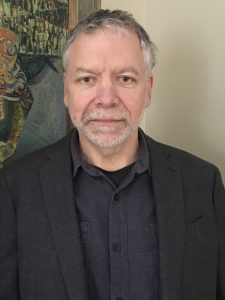The influence of music on Ralph Black’s poetry started when his parents met in Buffalo, New York — his father was the manager of the Buffalo Philharmonic, where his mother was a violinist.

“This is back in the late 1940s and the 1950s,” said Black, a poet, educator and the Week Nine poet-in-residence at the Chautauqua Writers’ Center. “So I grew up in the world of classical music. For me, writing poetry has been my way to try and find my way into music and musicality.”
Black said he spent much of his formative years listening to rock ’n’ roll, jazz and classical music.
“One week I’d be following around various rock groups, and the next I’d be at the Kennedy Center in Washington, listening to the Washington Opera, or the National Symphony,” he said. “And sometimes I’d go to a little jazz club when I was lucky enough to get a ticket. I got to hear McCoy Tyner and Bill Evans, which was absolutely fabulous music.”
At 12:30 p.m. EDT on Tuesday, Aug. 25, on the CHQ Assembly Virtual Porch, Black will deliver the final poetry Brown Bag lecture of the season on how poetry can engage with larger social and political questions. Black is the author of the poetry collections Turning Over the Earth and Bloom and Laceration, as well as The Apple Psalms, a poetry chapbook. He teaches English and creative writing at SUNY Brockport.
“I think poetry can be engaging socially and politically without falling into the morass of bombast and what I think of as mere rhetoric,” he said. “I think poetry has to be led by music and rhythm. And if it’s not doing that, then there’s something kind of flat about it, like a flat tire. Poems can have great intentions, and whose heart is in the right place, but the line just falls really flat.”
For Black, though the COVID-19 pandemic has inarguably changed many aspects of his life, he said that there are “many benefits to the lockdown life,” like “the fact that we have this … permission to go into the study or sit down at the desk and stare out the window and hope that the words come,” he said. “I’m hoping that it doesn’t last too long, of course. I’m in a really privileged position in that I have a house with a nice garden in the back, and I’m in upstate New York, which is a pretty good place to be in the pandemic.”
Black said that a quote from Robert Frost sums up best the state of writing poetry in the pandemic: “It begins in delight, it inclines to the impulse, it assumes direction with the first line laid down, it runs a course of lucky events, and ends in a clarification of life — not necessarily a great clarification, such as sects and cults are founded on, but in a momentary stay against confusion.”




